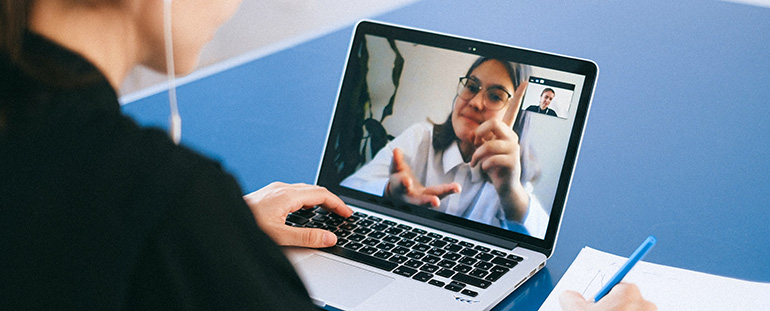
By Edward McIntyre
Macbeth watched Duncan and Sara’s images appear on his laptop.
“Good morning. Both still well?”
Nods. Duncan asked: “And you, uncle?”
“Fine. Rather be in the office with both of you. But — we adapt.”
In the background, a dog barks. “Fiona?”
“Indeed.”
Ping. Another face. “Dr. Dennis Marshall.”
“Good morning, Dennis. Meet Sara and Duncan. I invited Dennis to attend our call. We serve on a university ethics committee together. Academics, military, business leaders, doctors, lawyers. He’s interested in what we do.”
“I’m pleased to be here.”
Macbeth took the lead, “Sara, you’re teaching an ethics class tomorrow?”
“At the law school. Thought I’d scrap what I’ve prepared. Focus on ethics in the current environment.”
“Great idea. Everyone’s life has been turned on its head. Looking for ideas?”
“That’d be wonderful.”
“You might consider having your class revisit Rule 1.4. Especially, 1.4(a)(2). With everything disrupted, it may take on new meaning.”
Sara interrupted. “Dr. Marshall, Rule 1.4 deals with client communication. Rule 1.4(a)(2) has a lawyer consult the client about the means to accomplish the client’s objectives.”
“Thanks, Sara. Please, it’s Dennis.”
“I suggested it because the pandemic has changed so much. For so many. A client’s objectives last January or February are likely different now. Or could be.”
Sara followed up, “So, we’re saying a lawyer should check with each client. Now. Again. Assess the client’s goals. See if they’ve changed.”
“Precisely. Also, even if objectives remain generally the same, communication — competence as well — demand an assessment of the means the lawyer now has to accomplish those objectives. A lot has changed.”
Duncan followed up,
“With litigation at a standstill,that’s certainly one set of means [air quotes] that have changed. Likely others.”
Macbeth nodded. “Good observation. I also think we have to go further. Even though California didn’t adopt ABA Model Rule 1.14 —”
Sara interjected, “An ethics rule, Dennis, that addressed a client with diminished capacity.”
“Thanks.”
“Sorry, Dennis. Professional jargon. We don’t have a Rule 1.14. But you might have your class consider whether Rule 1.4 requires a lawyer — especially given the pandemic — to discuss health with their clients. Do they have an estate plan with a current medical directive? Always a touchy topic. Discuss their wishes if they become suddenly ill. Even their mental state.”
Sara spoke. “Excellent. Law students think they’re invincible. Important for them to remember: not all clients are 20-somethings. Clients have health issues — the pandemic highlighted that.”
“Two other topics you might consider. Confidentiality and competence. The pandemic forced all of us to use a lot of different ways to communicate. We’re on Zoom right now. Technology has benefits, but also risks.”
Sara smiled. “We’ve all seen the press reports of teleconferencing problems. Even porn-bombing calls and conferences.”
“That’s why I circulated an encrypted password to log in.I’m sure your students are tech-savvy. More than most lawyers.But we can’t stress our confidentiality obligations enough. Especially as we use temporary, or ad hoc, communication platforms. Ones that may not beas secure as what we’d use at the office.”
“Is that the tie-in to competence?”
“Spot on. We didn’t adopt Comment 8 to ABA Model Rule 1.1. Rule 1.1’s our competence rule, Dennis. But there’s a proposed amendment to our Rule 1.1.It would add a comment very similar to the ABA. Basically, make some level of technical competence an ethical duty.”
Sara explained, “The comment, Dennis, says that the duty of competence — the duties in the rule — include keeping abreast of, among other things, the benefits and risks associated with relevant technology. A lot of California ethics opinions — back as early as 2010 — have made the point. If the amendment’s adopted, this comment to the ethics rule will reinforce it.”
Macbeth continued, “It’s the risks inherent in technology that pose the threat to our confidentiality obligations. Especially lawyers not understanding them.”
Dr. Marshall spoke, “Interesting. We face the same dilemma. The pandemic forced many of us to do telemedicine for reasons other than emergency care. We also have patient privacy and confidentiality obligations. We have to be just as cautious. One problem we have is educating patients. Not just how to use telemedicine platforms, but also how to do it so that the communication remains secure. Almost like the reply-all problem.”
“Excellent point. Sara, you might want to have your class consider it. They’re tech-savvy. Their clients? Not always so.”
“Thanks, Dennis. I’ll try to get them thinking about their obligations to ensure their clients are reasonably protected. At least using secure means to communicate.”
“This gives you enough for your class, Sara?”
“It’s wonderful. Thank you all.”
Dr. Marshall concluded, “Thanks for inviting me. Best dinner break I’ve had. Now back to the ER.”
They signed off.
Edward McIntyre (edmcintyre@ethicsguru.law) is a professional responsibility lawyer and co-editor of San Diego Lawyer.